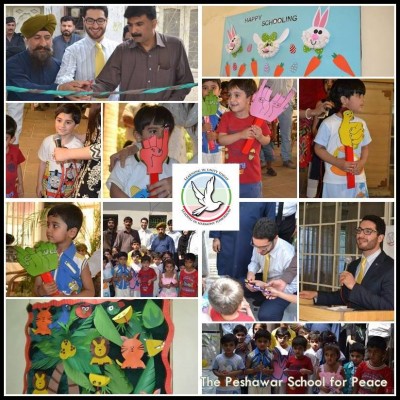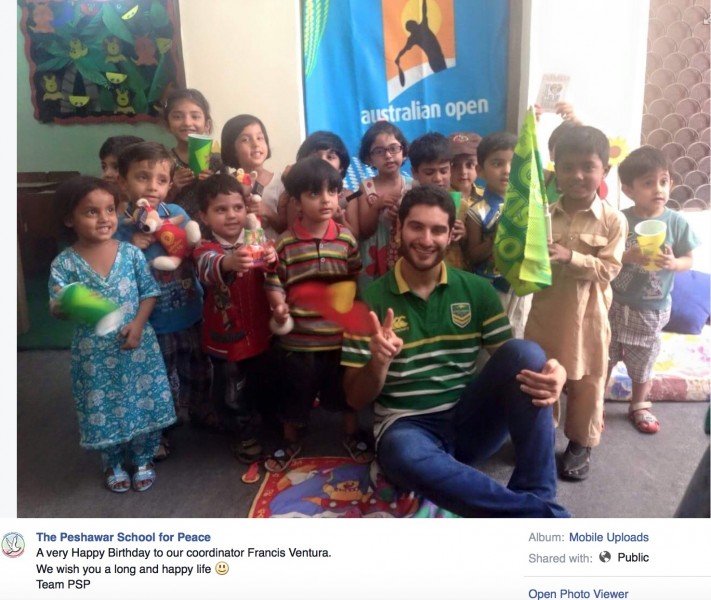After the Taliban attacked an army public school in Peshawar, Pakistan, in December 2014, killing 148 people including 132 children, there was widespread fear among parents over sending their young ones to school — a place of safety and learning warped into a potential target for violence.
However, schools resumed after one month, defying the threats. Now, one school in particular is spreading hope among the unease.
The Peshawar School for Peace, which was officially inaugurated on 6 May 2015, aims to promote interfaith harmony, girls’ education and social cohesion. It was founded by an Australian social justice activist, Francis Ventura, in collaboration of the Peshawar Youth Organisation. Men and women belonging to all religious communities work under one banner:
Learning in unity today, leading in harmony tomorrow.
Watch an introductory video posted to the organisation's YouTube channel below:
Global Voices spoke with Ventura as well as Maryum Daniyal and Aleina Ali Shah, who work on the project, about their aims, achievements and experiences with the school.
Global Voices (GV): After the traumatic events of December 2014, was it difficult to launch a school that promotes interfaith harmony and girls’ education?
Francis Ventura (FV): The Army Public School massacre sent shockwaves through the entire world. It is a well-known fact that many youth in Peshawar are still suffering from Post-Traumatic Stress Disorder. So in this long-standing context of extremist threat – particularly after the APS attack – our determination is strengthened and the need for a youth-led peace movement is made more urgent. We stand firmly on the side of humanity. We will always continue with our work in the face of pure evil, because so long as any child anywhere in the world is suffering due to poverty or conflict, all of humanity is weakened as a result.
Mariyum Daniyal and Aleina Ali Shah (MD & AAS): After the heartbreaking event of 16th December, 2014 it was quite challenging for us to practically launch a Peace School in Peshawar. It isn't easy to work on interfaith harmony and girls’ empowerment especially in Peshawar but so far we have achieved good results, and we are looking forward to spreading this message of Peace throughout Pakistan.
GV: The curriculum is designed to promote religious tolerance. Is this challenging, given that Peshawar is considered to be a conservative place?
MD & AAS: Everything; starting from the launch to convincing people on trusting us with a peace-oriented curriculum, was a big challenge, thankfully people have shown their trust in us. The society understands how important it is to build a peace-promoting generation now.
FV: The beauty of what we teach is that it is embraced by the local community. At our inauguration ceremony, we had scholars and community leaders from the Islamic, Christian, Hindu and Sikh communities all publicly speaking about the need to enhance respect among people of different faiths, as well as celebrating commonalities. They also specifically endorsed the Peshawar School for Peace as a model to achieve this. Most importantly, the feedback from parents has been overwhelmingly positive. We promote education for all – before anything else, we are all humans so we just love and appreciate each other.

The inauguration of The Peshawar School for Peace, 6 May 2015. Francis Ventura, cuts the ribbon along with people of all religious communities. From The Peshawar School of Peace's Facebook page
GV: Has the school been threatened by extremists?
FV: As a matter of protocol, we are unable to publicly discuss specific security matters pertaining to the School. However as individuals, we understand that there are those driven by evil, and we are aware of their actions elsewhere. The team is driven by an unflinching passion to build a better future for the children of Pakistan, and nothing will cause that desire to waver.
GV: What is the school's main goal?
FV: Our main goal is to achieve peace in Pakistan. We aim to achieve this through education, based on two critical pillars of development – social cohesion and girls’ empowerment. Additionally, we aim to bring the people of Australia and Pakistan together, the School has already held its first Skype call with a class in Australia, as well as encouraging our students to become global citizens, ready to serve humanity for the better and be ambassadors for peace.
GV: The project aims to build a relationship between Australian and Pakistani youth. Will this promote healthy relations on diplomatic level?
FV: You are correct – we are strengthening the citizen-to-citizen links between Pakistan and Australia. We hope that as a result of the growing links between our countries, diplomatic relations will also expand. Fortunately, Australia and Pakistan already enjoy a very robust friendship. There are regular visits between our countries by senior military personnel, government ministers and business delegations. There are thousands of young Pakistanis working and studying in Australia. In addition, we enjoy strong support from the Pakistani Consul-General in Sydney as well as the Australian High Commission in Islamabad. After the APS massacre, over 1,000 people came together for a vigil in Sydney’s Hyde Park to remember the victims and stand in solidarity with Peshawar. When Australian cricketer Phil Hughes was killed in an accident, candles were lit across Pakistan. This project gives me an opportunity to combine my love for Australia and Pakistan and bring people of each country together.
GV: As a foreigner, what do you think about Peshawar?
FV: Peshawar is my second home. I love everything about it. The incredible culture, rich in tradition and history. The warmth and generosity of its people. Their beautiful smiles. My heart is warmed every time I visit this magnificent place. People are always fascinated by meeting someone from a foreign land. As an Australian, conversations generally turn to cricket. I look forward to the day when delegations of Australian students can have the opportunity to visit Peshawar and experience the pleasures it has to offer.
GV: As women, what is your experience like working in Peshawar?
MD & AAS: Working in Peshawar on a peace project and also being women is not an easy thing to do, we face hardships and difficulties in everyday life, but that doesn't discourage us. What we think is that when you really want to do something, nothing can stop you.
GV: Tell us about the school's progress.
FV: It’s been about one year and a half since my first Skype conversation with the Peshawar Youth Organization, which became the inception of the project. We started with nothing – no money or contacts – just a dream. In that time, we have built a coalition of Partners for Peace across the world, including various United Nations bodies, the Malala Fund, businesses such as NetSol Technologies, Sunrise Marketing and Mark Industries, as well as religious and community groups such as the Australian National Dialogue of Christians, Muslims and Jews – the interfaith body of the respective religions’ peak representative bodies. Nowadays, we have an operational School, inclusive of pre-nursery and class one, as well as the Community Engagement Center. Close to 30% of our students are from the various minority communities, and a majority of the children are girls. Given that harmony between different faiths is severely lacking and that only 35% of girls in the Khyber Pakhtunkhwa region are literate, this is a significant achievement. We are looking forward to growing and spreading the message of peace and a common humanity throughout Pakistan and the entire globe.
GV: What message do you want to give the world?
FV: We cannot allow the future of humanity to be lost to those who represent evil and seek to impose it through violence and division. A better world is possible; we just have to strive for it. Everyone who believes in justice, peace and a common humanity must continue to strive for this. Social cohesion, while a beautiful phenomenon, is delicate and must be nurtured.
The attacks on the All Saints Church and Army Public School – as well as countless others – are examples of a situation in which evil prevails.
We invite all loving, good natured citizens of the world to stand with us. Become part of the movement for peace, which is already made up of people from many religious, ethnic and cultural backgrounds. We can only do this with your support. It is not the cause of any particular individual or organization – it is the cause of all humanity. Our Facebook page provides regular updates of the project and anyone is welcome to get in contact with us to pledge their support.
Together, and only together, we can and will achieve a better world. The future of humanity depends on it.








2 comments
Well these kind of organizations are doing very positive work and their work would be ranked very high in the peace initiative one day. We certainly need more of these projects in order to educate younger population against the fascist revolution.
Well done Anusha